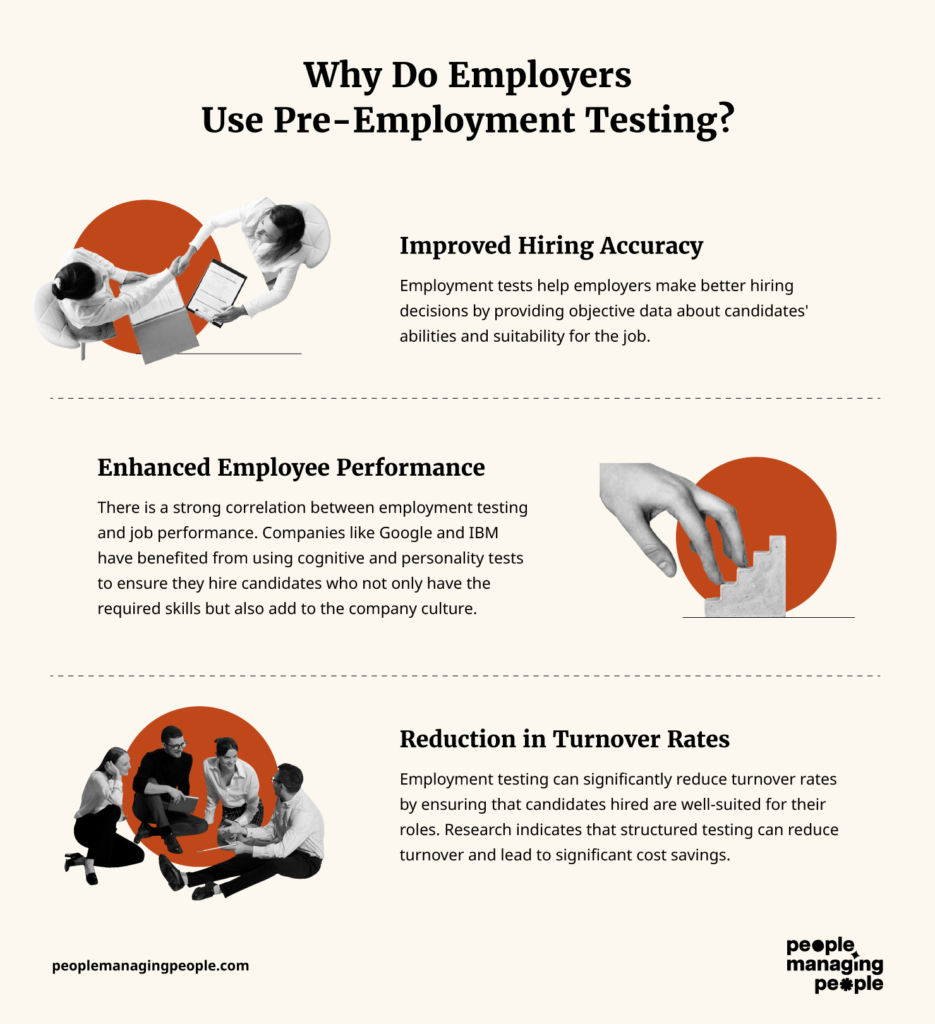Employment testing is a standard component in the modern hiring process, allowing employers to assess candidates' skills, abilities, and fit for the job.
These tests can typically be administered through recruiting software and significantly improve hiring accuracy, enhance employee performance, and reduce turnover rates.
In this article, we will explore the various types of employment tests, their importance, and how they benefit both employers and job seekers.
What Is Employment Testing?

Historical context
Employment testing has evolved significantly over the years and become a more integral part of the recruiting process. Initially, basic aptitude tests were used, but modern methods now include a variety of tests that assess cognitive abilities, personality traits, skills, and more.
Key milestones in the development of this practice include the development of psychometric testing in the early 20th century and the advent of computer-based testing in recent decades.
Why Do Employers Use Pre-Employment Testing?

Incorporating HR background check solutions into your testing phase helps validate a candidate’s qualifications.
Similar to why colleges use SAT scores to assess knowledge necessary for admittance, testing a candidate for an open role in a way that requires them to use the skills necessary for the job helps hiring managers determine who is the best fit among the talent pool.
Here are some other reasons.
Improved hiring accuracy
A study by Aberdeen Strategy and Research found that companies using pre-employment testing experienced a 39% lower turnover rate and are 24% more likely to have employees who exceed performance goals.
Enhanced employee performance
It's estimated that one fourth of employees hired through the traditional methods of screening resumes and conducting interviews will fail.
These traditional methods fail to showcase high performance employees skills and reward people who are able to perform well for interviews and in laying out their biographical information on a CV.
By using employment testing, employers can gain a view into the candidate's approach to the work, their knowledge of the disciplines necessary for success in the role and their problem solving abilities.
By hiring people with the necessary skills, employers also save on costs related to training and development.
Increased revenue and employee engagement
We already mentioned the 39% reduction in turnover rates from the Aberdeen study as pre-employment testing reduces the chance of a bad hire, but in addition to that, businesses that use it also experienced 23% increase in revenue and a 20% increase in employee engagement.
8 Types Of Employment Tests
If you’re thinking about rolling out some new pre-employment screening techniques, it’s always good to familiarize yourself with the most common and most effective employment testing that the recruiting discipline has unearthed over the years.
Here are some examples to help you as you look to hire new employees.
Cognitive ability tests
Cognitive ability tests measure a candidate's general mental capacity, including reasoning, memory, problem-solving, and comprehension skills. These tests are widely used in industries like technology and finance, where analytical thinking is crucial.
Personality tests
Personality tests assess various aspects of a candidate's character, such as their temperament, interpersonal skills, and work style. Popular personality tests include the Myers-Briggs Type Indicator (MBTI) and the Big Five Personality Traits. These also often appear as part of leadership assessments.
These tests help employers understand how a candidate will fit into the team and company culture.
Skills tests
Skills tests evaluate specific abilities required for the job, such as technical skills, language proficiency, and typing speed. For instance, a programming skills test is essential for software development positions, while a typing test might be relevant for administrative roles.
Physical ability tests
Physical ability tests are used for jobs that require physical strength, stamina, and dexterity. These tests are common in industries like construction, manufacturing, and law enforcement. Examples include lifting tests, endurance tests, and agility tests.
Integrity tests
Integrity tests are designed to assess a candidate's honesty, reliability, and ethical standards. These tests help employers maintain workplace ethics and reduce the risk of theft or fraud.
A study from The Journal of Pacific Rim Psychology showed that integrity tests hold predictive validity for workplace misbehavior but effectiveness varies on the type of test used, the industry it's being applied in and the nature of the deviance.
Emotional intelligence tests
Emotional intelligence tests evaluate a candidate's ability to understand and manage their own emotions and those of others.
These tests are valuable for assessing if someone has strong interpersonal skills, a factor that will be of great importance if you're hiring a manager or customer service professional.
Examples include the Emotional Quotient Inventory (EQ-i) and the Mayer-Salovey-Caruso Emotional Intelligence Test (MSCEIT).
Situational judgment tests
Situational judgment tests present candidates with hypothetical scenarios related to the job and ask them to choose the best course of action.
These tests are effective in assessing decision-making, problem-solving, and interpersonal skills. They are commonly used in management, sales, and customer service roles.
Job simulations
Job simulations require candidates to perform tasks that mimic the actual job. These simulations provide a realistic assessment of a candidate's abilities and how they handle job-related challenges. For example, a customer service simulation might involve handling a difficult customer complaint.
Tools for Employment Testing
We mentioned before that some pre-employment testing can be administered through recruiting platforms, but if you’re looking for something specific or specialized to an industry, you’ll want to check out our favorite pre-employment testing tools.
FAQs
How Reliable Are Employment Tests?
The reliability and validity of employment tests vary depending on the type and quality of the test. It’s essential to choose well-validated tests that have been proven to predict job performance accurately.
Can Employment Tests Be Used for All Types of Jobs?
Yes, employment tests can be tailored to fit various industries and job roles. However, it’s crucial to select the appropriate type of test that aligns with the specific job requirements.
What Are the Legal Implications of Employment Testing?
Employers must ensure that their testing practices comply with employment laws and regulations, such as the Equal Employment Opportunity Commission (EEOC) guidelines. It’s important to use tests that are fair, unbiased, and validated for the specific job role.
How Should Candidates Prepare for Employment Tests?
Candidates should familiarize themselves with the types of tests they will encounter and practice relevant skills. Reading test guidelines, taking practice tests, and staying calm and focused during the assessment can also help improve performance.
What Types of Employment Tests Can Be Managed Through Staffing Software?
Staffing software can manage a variety of employment tests, including cognitive ability tests, personality assessments, skills-based tests, and job-specific simulations. These tools can be integrated to evaluate candidates’ problem-solving abilities, work style, and technical expertise. The staffing software streamlines the administration and analysis of test results, helping recruiters make data-driven hiring decisions.
Want to keep up with all the latest trends in recruitment and HR? Subscribe to the People Managing People newsletter and get all the latest insights delivered straight to your inbox.


